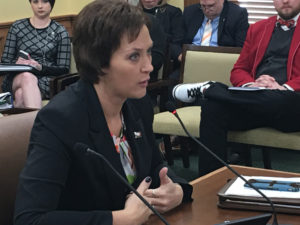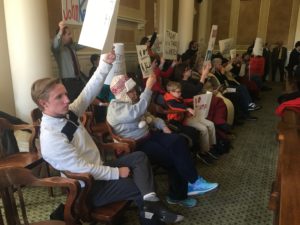
© 2017 by Steve Brawner Communications, Inc.
There’s a scene in “All the President’s Men,” the movie about the Washington Post reporters who dogged the Nixon White House until the president resigned over Watergate. Reporter Bob Woodward, played by Robert Redford, meets in a darkened garage with his background source, “Deep Throat,” played by Hal Holbrook, and says the story is stuck. “Follow the money. … Just follow the money,” Holbrook’s character tells him.
It’s as true today as it was then. It’s my experience covering the State Capitol that most elected officials at the state level are decent folks, and when they compromise, it’s more often out of strategic necessity than a failure of character. Still, if you want to know the whole story in politics, you always have to follow the money.
Rep. Jana Della Rosa, R-Rogers, agrees, which is why, just as she did in her first legislative session in 2015, she’s sponsoring a bill that would make it much easier for any citizen with an internet connection to do what Woodward was trying to do.
House Bill 1427 would require candidates for constitutional offices (governor, attorney general, etc.), judicial offices, and state legislative seats to file all of their campaign finance reports online in a new, searchable database.
Here’s how that would change things. Currently, anyone can go on the Arkansas secretary of state’s website (votenaturally.org) and pull up the campaign finance reports for each individual candidate, one month at a time.
If House Bill 1427 passes, journalists, watchdog groups and average citizens could quickly search everything in the database and determine which lobbyists or political action committees have donated how much to whose campaigns. If an industry gets special treatment under the law, it would be much easier to see if campaign donations might have played a part.
If that last paragraph sounds like I’m bashing elected officials, I’m not. Winning elected office requires campaigning, and campaigning requires money, and then afterwards the winning candidates must make decisions that affect their donors. It’s not a perfect system, but it’s the one we have.
Efforts to limit campaign donations in recent years have failed, partly because of court decisions and partly because ours is a free market society where money will find its way to power. But we also have an open society where information is often even more powerful than money. So one very workable solution that is consistent with both a free market society and an open society is to make it really easy for average Arkansans to follow the money.
Della Rosa’s bill failed in 2015 based on some good excuses and some lame ones. Legislators said many candidates did not have access to reliable internet service, and they complained about the state’s balky online reporting system – both very good excuses. In 2016, Della Rosa pushed through an appropriation to build a new and very good online system that cost $670,000. So that good excuse is out. There’ve been two more years of improving internet service across the state, and the bill would let legislators in truly underserved areas file their reports the old-fashioned way, by paper. So that good excuse is pretty much gone, too.
That just leaves the lame excuses, such as the one offered in 2015 by one legislator who said he represented a district with a large paper industry presence, so he couldn’t vote for a bill that would reduce the use of paper.
Della Rosa’s bill passed the House State Agencies and Governmental Affairs Committee comfortably Wednesday on a voice vote. Several legislators spoke supportively. Rep. Kim Hammer, R-Benton, said the bill would force him to change his habits, but he was willing to do so because of the good that would come of it.
The bill now moves to the full House, where it was expected to be debated Friday and where it must pass by a two-thirds majority because it changes two initiated acts approved by the voters. Then it must pass through a Senate committee and the full Senate before landing on the governor’s desk.
Every legislator who votes for the bill is inviting more accountability and transparency. Instead of forcing voters to stumble around a darkened garage, they’re bringing a flashlight and shining it on themselves.
To borrow a line from another movie, “Jerry Maguire,” if it passes, it will show us the money. If we don’t follow it, it’s our fault.

